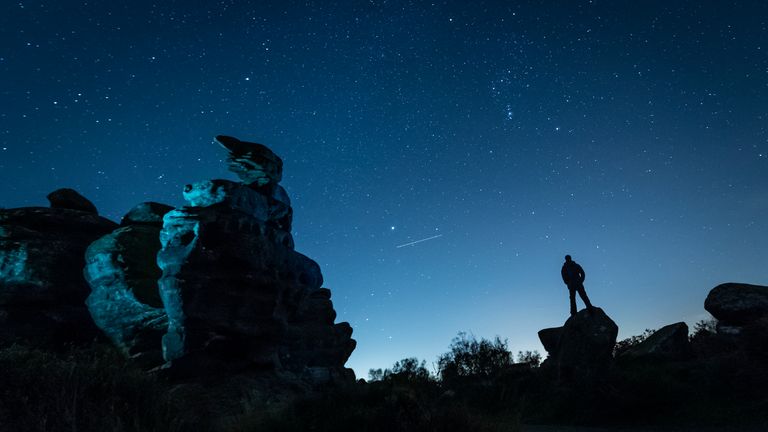An incredible display of celestial fireworks may be visible overnight as debris left by Halley’s Comet streaks across the night sky – but the moon may end up ruining the view.
The Orionid meteor shower, which has been going on all month, peaks for several hours from midnight tonight, offering you the best possible chance, in theory, of seeing the spectacle for yourself.
What could I see?
The annual shower presents a dramatic light show, producing up to 25 meteors every hour until the early morning.
You’ll have seen some dazzling shots from observers in the past.
What is it?
The Orionid Meteor Shower that we’ll (hopefully) be seeing is a result of the Earth passing through debris of Halley’s Comet.
Each time that Halley returns to the inner solar system, its nucleus sheds ice and rocky dust into space. The dust grains eventually become the Orionids in October.
This happens because Halley’s Comet intersects Earth’s path twice every year due to the respective elliptical orbits around the sun.
It leaves behind the ice and rocky dust which, when they enter Earth’s atmosphere, become the Orionids, as well as the Eta Aquariid meteor show in May.
The phenomenon gets its name from the Orion constellation – which is one of the brightest groups of stars in the sky.
The meteoroids can travel at high speeds of 148,000mph through the Earth’s atmosphere and appear as vast streaks of light.
With the comet only swinging close enough to Earth to see it once every 75 to 76 years, this annual shower provides some compensation for those who may miss that rare event.
How can I see it?
The good news is that you can leave your high-powered telescope at home, because the meteor shower is visible to the naked eye in all parts of the sky.
All you need, according to experts, is a bit of patience, a clear sky and a safe spot away from street lights and other light pollution.
Experts advise that you get yourself in a position to spot the shower around 30 minutes before you hope to see it, giving your eyes plenty of time to adjust to the darkness before the best viewing time between midnight and dawn.
When observing, NASA suggests lying flat on your back with your feet facing southeast if you are in the Northern Hemisphere or northeast if you are in the Southern Hemisphere, and taking in as much of the sky as possible.
Why is it likely to be difficult this year?
Clouds are often the biggest concern for stargazers hoping to catch the spectacle – but this year your view is likely to be hindered by the amount of natural light from the moon.
That’s because the moon is in the midst of what’s known as a waning gibbous, according to the Royal Greenwich Observatory, which is the reducing phase between a full moon and a half moon.
The observatory says this means conditions are not particularly favourable this year – but the moon will continue to reduce its light between now and 7 November, so even if you don’t see it tonight there may still be a chance later on.



























